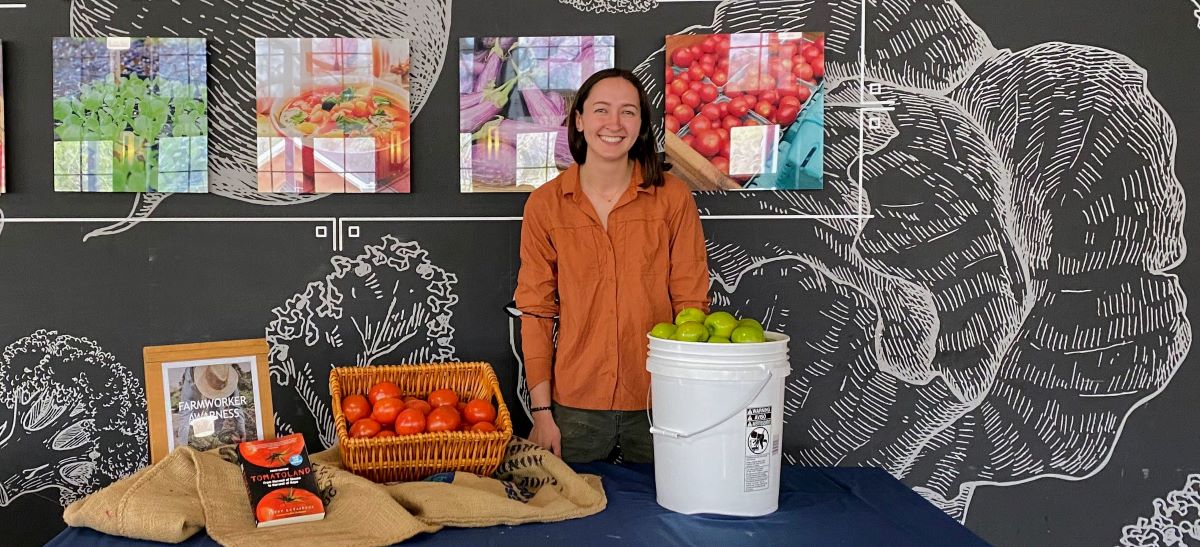A Conversation about Farmworkers’ Rights
- by Elise Dudley

On my table sat a hefty 5-gallon bucket overflowing with green apples. Weighing in at 32 pounds, the fruit represented the average harvest bucket of green tomatoes for which farmworkers in Florida — where most of the tomatoes east of the Mississippi come from in the winter months — are paid a shocking 45 cents per bucket.
I’d carried this heavy load into the Oxford Dining Hall of Emory University to educate students about the plight many farmworkers in the United States face. To draw students in, I arranged a table with the bucket, a small basket of ripe red tomatoes, purchased in accordance with the Fair Food Agreement, along with the book “Tomatoland” by Barry Estabrook as a recommended resource for curious students.
I eagerly waved passing students over to the table, challenging them to lift the bucket. I explained what the bucketful of green apples represented and followed up with a heavy question: “How much do you think a farmworker gets paid for picking up this whole bucket of tomatoes?” After picking it up, sensing the weight, and contemplating the time required to harvest, students’ responses ranged from $2 up to $150 dollars.
As we spoke, the tone of conversation shifted from playful banter to seriousness. I emphasized how the lowest guess of $2 could transform compensation for farmworkers within our food system. Even the most conscientious eaters and food industry professionals are usually in the dark and unable to answer the question “who picked my food?” Standing beside listening students, I reflected on my own shock learning about the lack of basic legal worker protections in our agriculture industry and my own experiences working on an organic farm.
Many students I interacted with were taken aback. Some had never considered farmworker pay, while others were dismayed. A handful asked about what they could do. Students questioned, “how can policy address farmworker issues?” and “where can I learn more?”
I explained that federally farm work has little or no overtime limits, child labor restrictions, collective bargaining rights, or workers’ compensation insurance — despite agriculture being considered one of the most hazardous industries in the U.S. The reality of farm labor is serious and urgent, and food service corporations hold great power and responsibility to raise the standard.
I was glad to be able to share with students that Bon Appétit has a legacy of taking responsibility to improve the lives of farmworkers, which started in 2001. It was then that Bon Appétit became the first food service company to support the voices and rights of farmworkers in the boycott of produce grown by NORPAC members (the largest food packing and processing cooperative in Oregon). Since then, Bon Appétit has continued to push for higher labor standards. After signing the Fair Food Agreement in 2009 (part of what is now the Fair Food Program), Bon Appétit conducted research with United Farm Workers of America on the lack of laws and protections for U.S. crop farmworkers; hosted a TEDx conference focused on farmworkers and labor movements; welcomed national farmworker awareness week into cafés, committed to Fair Trade tea; and became a founding member of the Equitable Food Initiative.
Encountering injustice begs action. For most Americans, matters of farmworkers’ rights remain hidden, so critical action never occurs. Programs like the Fair Food Program seek to remedy this knowledge gap and I was heartened to play a small part in raising the profile of this critical movement for students.